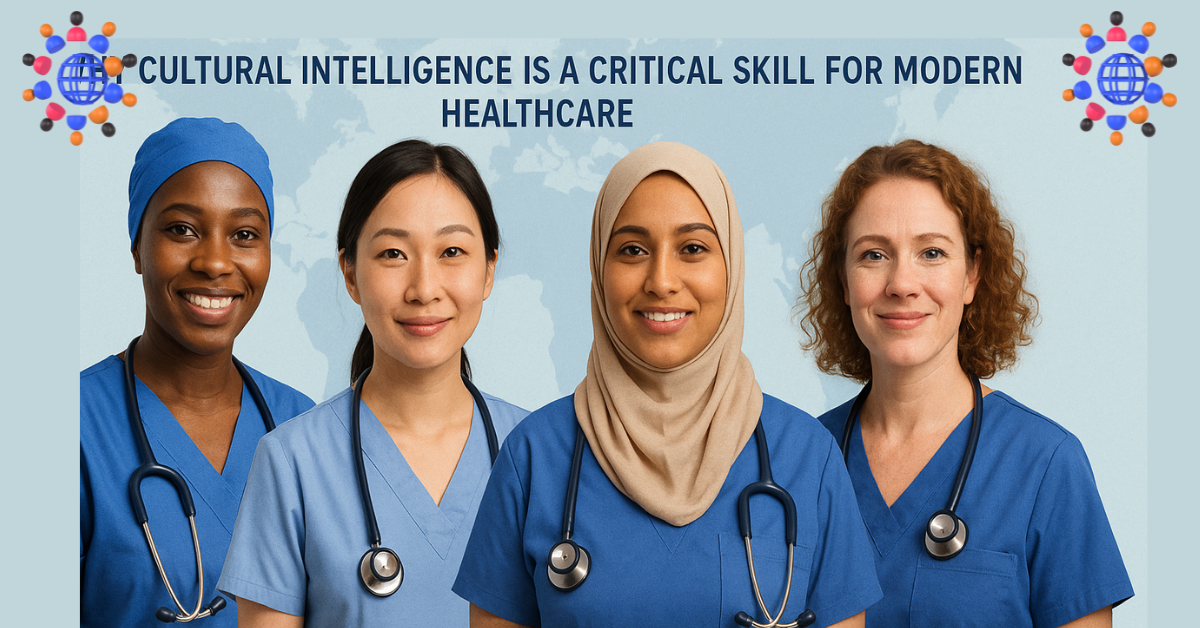The Global Nurses Local Impact Why Cultural Intelligence Is a Critical Skill for Modern Healthcare. Cultural intelligence is critical for nurses around the world because it enables them to provide effective and culturally sensitive care, leading to better outcomes and greater patient satisfaction, according to the Egyptian Journal of Health Care.
By understanding and respecting different cultural beliefs and practices, nurses can build trust, promote open communication, and tailor care to individual needs. Ultimately, this improves the quality of care and reduces inequalities in the healthcare system.
Why Cultural Intelligence Is a Critical Skill for Modern Healthcare Global Nurses Local Impact
In the digital era, the delivery of medical care goes much beyond the knowledge of a healthcare professional. As patient populations keep becoming more diverse, nurses are at the cultural junctions of modern healthcare. Cultural intelligence an ability to survive and work in different cultural contexts effectively has become a must-have skill for nurses in each and every corner of the world.
The Changing Face of Healthcare
Healthcare settings now serve as microcosms of our global society. A nurse working in Berlin strength care for patients from Syria, Turkey, and Ukraine in a one shift. Similarly, nurses in big town areas of the United States regularly interact with patients from lots of different cultural backgrounds, each bringing unique health beliefs, communication styles, and expectations.
What Is Cultural Intelligence?
Cultural intelligence (CQ) encloses the ability to recognize, respect, and respond appropriately to cultural differences. For nurses, this means:
- Understanding how culture shapes health beliefs and practices
- Adapting communication styles to bridge expressive and cultural gaps
- Acknowledge cultural influences on symptom expression and treatment preferences
- Building trust across cultural differences
Real-World Applications
Language Acquisition as Cultural Immersion
Take the example of international nurses preparing to work in Germany. Learning medical German goes beyond vocabulary remember—it requires understanding cultural nuances in healthcare communication:
When a German patient describes pain as “unangemehm” (uncomfortable) rather than “schmerzhaft” (painful), this precise expressive choice may reflect cultural attitudes toward expressing discomfort. The culturally intelligent nurse recognizes these patterns and adjusts assessment approaches accordingly.
Cultural Intelligence in Examinations
Nurses preparing for international qualification exams like the OET (Occupational English Test) or German Fachsprachenprüfung must demonstrate cultural intelligence alongside clinical knowledge:
During an OET speaking examination, a nurse might encounter a scenario involving an elderly patient from a culture where healthcare decisions are made collectively by family members. The culturally intelligent response acknowledges this family-centered approach while still respecting patient autonomy according to local practices.
Practical Strategies for Developing Cultural Intelligence
- Cultivate self-awareness: Recognize your own cultural assumptions and biases
- Practice active listening: Hear not just words but cultural context
- Develop adaptable communication skills: Learn to adjust your approach based on cultural cues
- Seek cultural mentors: Connect with colleagues from diverse backgrounds
The Impact of Cultural Intelligence on Patient Outcomes
Research increasingly shows that culturally responsive care leads to:
- Improved patient satisfaction
- Better adherence to treatment plans
- Reduced healthcare disparities
- Fewer miscommunication-related adverse events
Conclusion
With the globalization of healthcare, cultural intelligence becomes as essential for nursing care as clinical competencies. Through enhancing their cultural intelligence, these nurses will become truly global healers who are able to give healing and effective care to all the people irrespective of their culture.
A nurse who is able to communicate with people from any culture not only helps the person recover from the diseases but also makes the patient feel one with the world they live in. In our diverse world, this knowledge of the cultural background of a patient has the potential of being the second most powerful tool when employed in nursing compared to none.
Read More:
https://nurseseducator.com/didactic-and-dialectic-teaching-rationale-for-team-based-learning/
https://nurseseducator.com/high-fidelity-simulation-use-in-nursing-education/
First NCLEX Exam Center In Pakistan From Lahore (Mall of Lahore) to the Global Nursing
Categories of Journals: W, X, Y and Z Category Journal In Nursing Education
AI in Healthcare Content Creation: A Double-Edged Sword and Scary
Social Links:
https://www.facebook.com/nurseseducator/
https://www.instagram.com/nurseseducator/

Can you be more specific about the content of your article? After reading it, I still have some doubts. Hope you can help me.
I don’t think the title of your article matches the content lol. Just kidding, mainly because I had some doubts after reading the article.
Can you be more specific about the content of your article? After reading it, I still have some doubts. Hope you can help me.
Your point of view caught my eye and was very interesting. Thanks. I have a question for you.
Hi there! I could havee sworn I’ve been to your blog before but after looking at many of the
posts I realized it’s neew to me. Anyways, I’m definitely happy I came across
it and I’ll be bookmarking it and checking back often! https://bookofdead34.wordpress.com
Thank you for your sharing. I am worried that I lack creative ideas. It is your article that makes me full of hope. Thank you. But, I have a question, can you help me? https://www.binance.info/tr/register-person?ref=W0BCQMF1
Can you be more specific about the content of your article? After reading it, I still have some doubts. Hope you can help me.
Your point of view caught my eye and was very interesting. Thanks. I have a question for you.
Your point of view caught my eye and was very interesting. Thanks. I have a question for you.
Thank you for your sharing. I am worried that I lack creative ideas. It is your article that makes me full of hope. Thank you. But, I have a question, can you help me?
Your article helped me a lot, is there any more related content? Thanks! https://www.binance.com/fr-AF/register?ref=JHQQKNKN
Your article helped me a lot, is there any more related content? Thanks! https://accounts.binance.info/en-ZA/register-person?ref=B4EPR6J0
Your article helped me a lot, is there any more related content? Thanks! https://www.binance.com/cs/register?ref=OMM3XK51
Thanks for sharing. I read many of your blog posts, cool, your blog is very good.